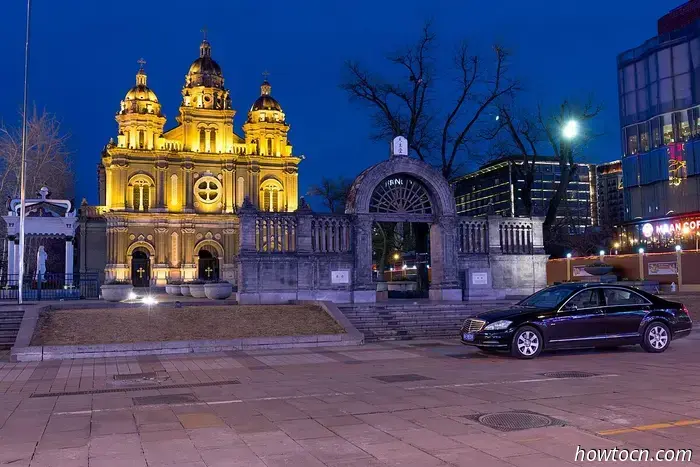
Nestled among shopping centers, government buildings, and serene hutong streets are four of Beijing's renowned churches. These historical edifices, reconstructed after enduring turbulent times, narrate a complex tale of imperial diplomacy, missionary dedication, and urban resilience. While many tourists are drawn to the Forbidden City or the Temple of Heaven, few are aware that just a short distance away, these churches are rich in history.
St. Joseph's Church
We begin with St. Joseph's Church, locally known as 东堂 (Dōngtáng or East Church), situated on Wangfujing Dajie. Erected in 1904 atop the remains of earlier churches that fell victim to the Boxer Rebellion, this gray stone building combines Renaissance and Baroque styles. With its spires and arched windows, it attracts thousands of visitors, yet it continues to serve a dedicated congregation. This church symbolizes an era when French Jesuits were influential in the city, blending diplomacy with faith and imperial interests.
St. Joseph's Church 东堂 74 Wangfujing Dajie, Dongcheng District东城区王府井大街74号 Hours: Mon-Fri, 8am-11am, 2pm-5pm; Sat-Sun, 8am-7pm
Church of the Saviour
To the west stands the Church of the Saviour, also referred to as Xishiku Church or 北堂 (Běitáng, or North Church), tucked away behind tranquil alleys close to Zhongnanhai. Initially built by French Jesuits and finished in 1703, it has seen several reconstructions. The current structure, which showcases pointed Gothic arches, was constructed and designed by Lazarist missionaries in the 1890s, although it has undergone further renovations since then. Today, the church remains active, attracting a diverse congregation, including elderly parishioners, curious visitors, and young converts. The services during Christmas and Easter are particularly well-attended.
Church of the Saviour 北堂 33 Xishiku Dajie, Xicheng District西城区西什库大街33号 Hours: 8:30am-5pm
Cathedral of the Immaculate Conception
The Cathedral of the Immaculate Conception, informally known as Xuanwumen Church or 南堂 (Nántáng, or South Church), is located on Qianmen Xidajie and is the oldest Catholic church in Beijing. It was first established in 1605 by Jesuit missionary Matteo Ricci, who used it as his residence until his passing in 1610. Over the years, it has been rebuilt multiple times due to fires and political instability. The present structure, completed in 1904, exemplifies a restrained Baroque style. After being closed for renovations from 2019 to 2021, it is now open and continues to hold daily mass.
Cathedral of the Immaculate Conception 南堂 141 Qianmen Xidajie, Xicheng District西城区前门西大街141号 Hours: 8am-11:30am, 2pm-5pm
Church of Our Lady of Mount Carmel
Situated behind the busy transport hub of Xizhimen, the Church of Our Lady of Mount Carmel, often called Xizhimen Church or 西堂 (Xītáng, or West Church), provides a rare moment of tranquility amidst the hustle of northwest Beijing. Originally built in 1723 by Italian missionary Teodorico Pedrini, it became the first non-Jesuit church in the city. This church has also been reconstructed several times, with the current building having been completed in 1912. Its modest Gothic style features a simple bell tower, and it is relatively small. It remains active, hosting regular masses as well as Christmas services.
Church of Our Lady of Mount Carmel 西堂 130 Xizhimennei Dajie, Xicheng District西城区西直门内大街130号 Hours: Mon-Sat, 8am-11:30am, 2pm-5:30pm; Sun, 8am-5:30pm
In a city where tradition and change continuously intersect, Beijing's Catholic churches stand as both lasting monuments and active places of worship. They have weathered imperial restrictions, foreign occupations, political skepticism, and urban gentrification. Whether entering for mass or out of curiosity, these churches provide a window into Beijing's historical narrative.
READ: In Praise of Beijing's Strange and Ugly Buildings
Images: Wikimedia Commons: Morio CC BY-SA 4.0, EditQ CC0, © Peter Potrowl, N509FZ CC BY-SA 4.0




Nestled among shopping centers, government buildings, and tranquil hutong alleyways are four of the most renowned churches in Beijing.